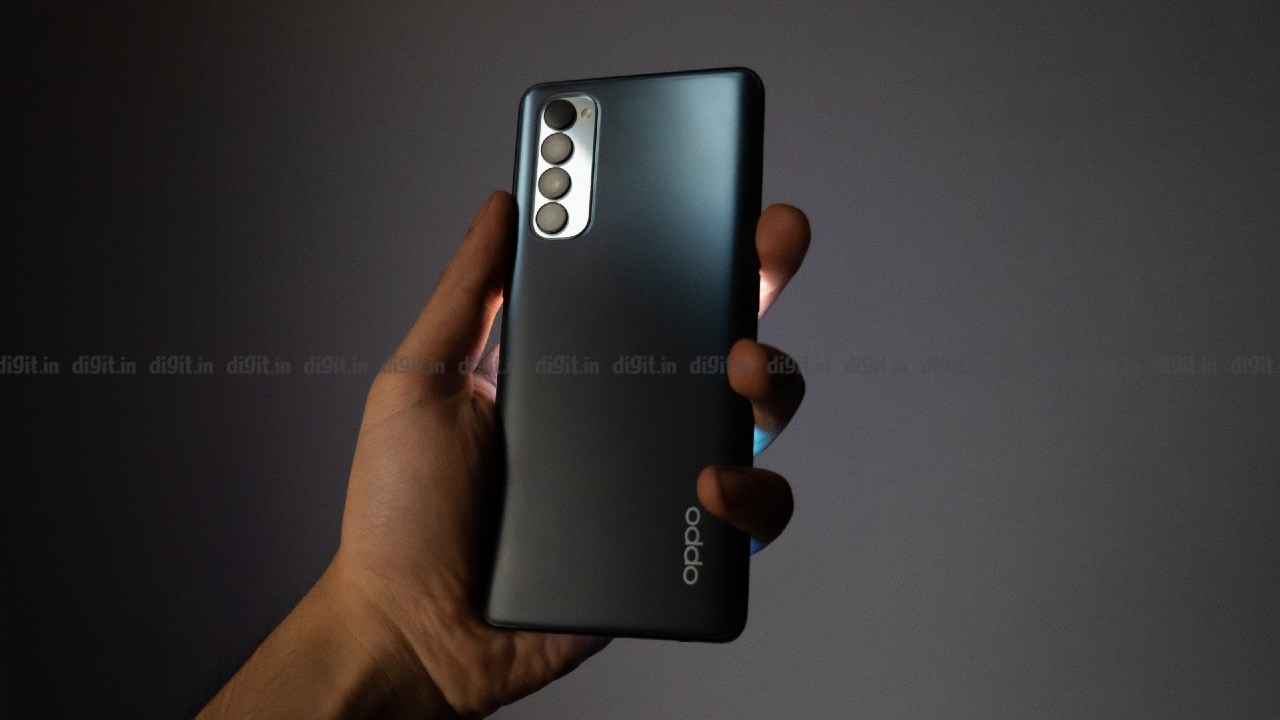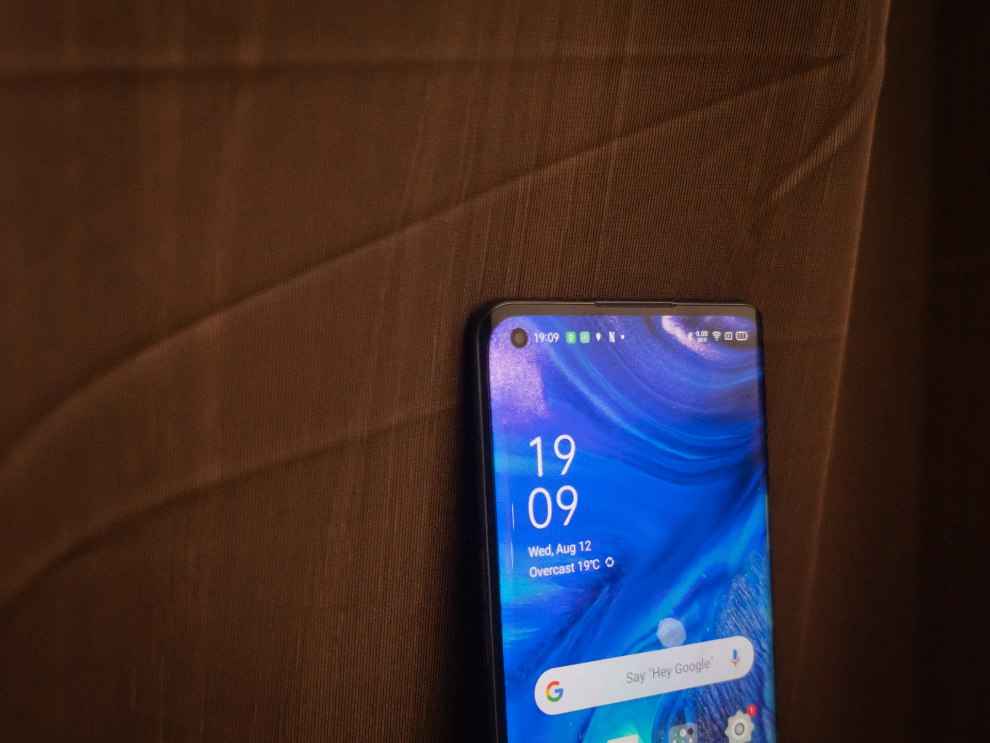

Buy the Reno4 Pro if all you want from a smartphone is a lightweight, ergonomic design and hyper-fast charging. For everything else, there are better alternatives like the OnePlus Nord, iQOO 3 and the Realme X3 SuperZoom.
For a performance enthusiast or a gamer, the Reno4 Pro is easy to write off looking at the spec sheet. But for the general user, the Reno4 Pro may still offer a few compelling features, enough to make it a smartphone of choice, provided you have the budget for this smartphone. The Reno4 Pro is rather expensive for the core hardware under the hood, but then, it’s not as much about the specs than it is the experience that makes a smartphone worthy of recommending. Is the Reno4 Pro worth buying? We find out —
The Oppo Reno4 Pro is powered by the Qualcomm Snapdragon 720G, the same chipset that powers a bunch of smartphones under Rs 20,000, and can arguably be called a popular mid-range chipset. The price of the smartphone, however, is in the high-end flagship territory. It’s hard to justify that choice for power users, but for someone looking for an affordable good-looking smartphone for the basics, the Reno4 Pro should work just fine. Options like the OnePlus Nord, Realme X3 SuperZoom and the iQOO 3 outshine the Reno4 Pro in nearly every way except for the design, may be. But that's subjective. However, the gap in performance is not something one would really know unless they're constantly switching between apps, or gaming or running benchmarks.


The benchmark results clearly state how far behind the Reno4 Pro really is, as compared to its peers in this price range.
The performance gap that we see on benchmarks is barely noticeable in daily use though. Of course, it’s not the butter smooth experience you get from a Snapdragon 855 or an 865 processor, but it’s not easy for an average user to gauge that. I picked up the Reno4 Pro after using the OnePlus Nord for a week, and while the usual operations seemed just as smooth, minor things like a small delay in launching apps, or switching cameras, or unlocking the screen became evident. Things that won’t really bother the vanilla smartphone user, habitual to mid-range performance.
The Reno4 Pro isn’t going to impress gamers either. The Snapdragon 720G can only run the popular games with medium graphics. We played a few rounds of PUBG Mobile and COD: Mobile and neither of them allowed the Reno4 Pro to run at the highest graphics settings. However, CoD Mobile did manage to hit 60 FPS like we have noted in the Realme 6 Pro and the Redmi Note 9 Pro, both of which run the game at 60 FPS as well. Most likely, the Adreno 618 gets maxed out running games at low graphics, because CPU usage is just around 20 per cent during gaming.
PUBG Mobile also only hit 30 FPS on GameBench, and that too at HD graphics. So the draw distance, textures, and other details are far lesser than smartphones the Reno4 Pro competes with. Having said that, the gameplay on both PUBG Mobile and COD: Mobile is quite smooth, but no perceivable frame drops. The touch response are nothing like the flagships, and the 90Hz screen doesn’t really come into play here, but you do get a dedicated gaming mode where you can set individual profiles for each games, and enable what Oppo calls “Tournament Mode” which apparently boosts the performance.
Part of what makes this mid-range smartphone usable enough, is the ColorOS 7 software. Oppo smartphones were not known for smooth, minimalist UI until recently with the rollout of ColorOS 7 — One which manages to offer both personalisation and minimalism in the Reno4 Pro. You can choose how your icons will look, the wallpaper and app layout and more from the Settings, and even apply various pre-built themes available in the theme store. There’s also a capable dark mode and a nifty always-on display as well with cool clock styles.
Annoyingly enough, the Reno4 Pro still has some of the apps that was banned by the Indian Government. It’s still harmless because they don’t work and can be uninstalled. What irked me was the fact that despite paying Rs 34,999, there isn’t anything special in the software to write about. Almost all the features are the same as what you’d get any other Oppo smartphone priced much less.
The Reno series started off with a nicely tuned camera in the Reno 10X Zoom, but over the past few iterations, the camera has been quite disappointing. The Reno4 Pro’s quad camera setup also evoked the same feeling. The 48+8+2+2 MP setup is common for mid-range smartphones priced under Rs 20,000, and it's natural to expect some level of differentiation to motivate the buyer to consider paying more. The camera is how most OEMs differentiate, but not the Reno4 Pro. It’s performance is strictly average, and a far cry from the images the Reno 10X Zoom took.
Daylight
Oppo Reno4 Pro vs Competition:
Shot on Oppo Reno4 Pro
Shot on iQOO 3 5G
In the daytime, the Reno4 Pro takes photos with good colours, and the right amount of saturation and vibrance. The dynamic range is on the lower side, and so is the details when compared against images taken from phones like the iQOO 3.
Lowlight
Oppo Reno4 Pro vs Competition:
Shot on Oppo Reno4 Pro
Shot on iQOO 3 5G
The Reno4 Pro comes with a Night Mode which takes a good few seconds to take a low-light photo. The result is an image that looks brighter, but doesn’t have much details when you zoom in.
Portraits
The portrait mode algorithm does the usual beautifying enhancements which smoothens the skin and makes faces appear fairer. The subject separation is accurate, however, and you get a sharp image with lots of filters to experiment with.
Macro
Shot on Oppo Reno4 Pro
Shot on iQOO 3 5G
The 2MP macro is best left unused. Yes, you can go close to a subject up to 4cm, but the colour appear completely faded, and there’s no details whatsoever. The iQOO 3 beats the Reno4 Pro to the punch using a software-induced macro mode.
Videos
The video capabilities of the Reno4 Pro is limited to 4K at 30 FPS, and while the phone manages to maintain focus, the quality of videos are much sharper in smartphones like the iQOO 3 priced the same. The light weight of the phone does help in keeping the phone stable though, and there’s a software-assisted Ultra Steady mode, which is quite handy.
Here’s where things get interesting. While the Reno4 Pro is strictly average in performance and camera, it sure does last long. And even when it eventually dies, it comes right back up in less than 15 minutes of charging. It has the same 65W fast charger that the Realme X50 Pro already offers, and that’s quite a game changer on its own, even though this feature alone doesn’t justify the price you have to pay. The power draw is quite controlled thanks to the Snapdragon 720G largely, and Oppo’s own resource management algorithms working in the background. The latter might become an annoyance if you switch between apps a lot, because in my case, I had the BatteryLog app running to log the battery drain, and it kept dying every few hours.
What really makes the Reno4 Pro compelling to consider is the design. The smartphone isn’t the most powerful, but it sure does look fantastic. That’s definitely a trait the Reno4 Pro has borrowed from the Reno 10X Zoom. The first thing you’ll notice picking up the phone is it's incredibly light weight and the frosted matte finish. In the way it feels in hand, the Reno4 Pro’s design is a lot like the special edition Realme X series, the ones named Onion and Garlic for some reason.
What works in case of the Reno4 Pro is the feather-light weight and the slim profile. It’s just 7.7mm thick and rocks a curved AMOLED display that blends in with the plastic body along the edges. As a result, the Reno4 Pro can be easily used one-handed. It’s really ergonomic, doesn’t slip and doesn’t attract the ugly smudges and fingerprints.
As for the display itself, it’s decent for the usual tasks but lacks features like HDR support for Netflix, and other streaming apps like its rivals offer. The 6.5-inch AMOLED panel is still HDR-rated though, and supports DCI-P3 colours in the apps and UI. There’s also the OSIE Vision Effect that’s present in nearly every Realme and Oppo smartphones. Turning it on adds a warm tinge to the screen when a video is playing. The brightness levels are ideal for indoor usage. Using it under direct sunlight will cause colours to fade and make reading text difficult.
Overall, the Oppo Reno4 Pro is a strictly average smartphone that looks good, and charges in an instant. The design and the battery life are the only two things that somewhat justifies the price tag, but without the performance to back it up, the Reno4 Pro feels like a half-done job. It feels like Oppo started off with making a premium smartphone — it got the outer shell ready, but then pivoted to making a mid-range smartphone. As a result, the Reno4 Pro can be easily mistaken as a high-performing smartphone with premium camera performance, but in reality, it’s just average.
Buy the Reno4 Pro if all you want from a smartphone is an ergonomic design and hyper-fast charging. For everything else, there are better alternatives like the OnePlus Nord, iQOO 3 and the Realme X3 SuperZoom.